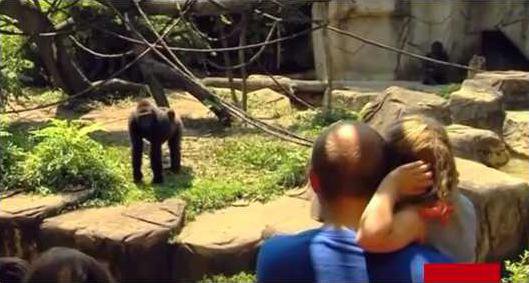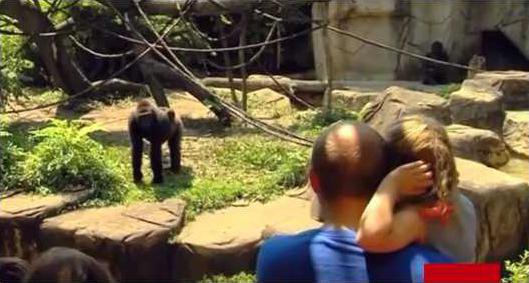Ive had a lot of thoughts about the incident that led to the death of 17-year-old gorilla Harambe at the Cincinnati Zoo recently.
It was, no doubt, a very difficult decision by zoo officials and the Dangerous Animal Response Team as they determined to end the life of an animal that is considered endangered and was so well-loved at the zoo to save the life of the 4-year-old boy who fell into his enclosure.
However, as sad as it must have been to make that choice of human life over animal life, I have to admit I agree wholeheartedly with the decision that was made. Watching the footage of that tiny boy looking up at a 440-pound animal made me physically ill. As awful as it must have been for the zookeepers, I cannot even fathom what was going through that little boy's mothers head as she watched her son being dragged under the water of the moat and at one point flung into the air, landing on his back.
The zoo's Dangerous Animal Response Team considered the situation life-threatening, and while the boy was not under attack, he was certainly at risk of major injuries or worse, Cincinnati Zoo director Thane Maynard said in an article published on cnn.com.
All sorts of things could happen, Maynard said.
The boy did not sustain any life-threatening injuries and will hopefully recover quickly from this traumatic event.
But what about his mother? I have been appalled at the viral attacks and threats targeted at her. She is also currently under investigation, and while I certainly hope she and her family are treated justly and fairly, I hope some mercy is extended to this woman whose attention was elsewhere for just one minute.
What I do know is that children can be slippery. They can disappear in an instant, even when you are consciously and diligently watching.
May I open my heart and share a difficult personal story of why I know this to be true?
A few weeks ago, I was visiting my sister who lives on the third story of an apartment complex. We decided to eat lunch out on the patio of her home and let the children play beside us. My little baby was inside munching on snacks in the high chair while I watched him from a few feet away on the balcony.
When he started to fuss, I got up and told my sister, I am going to get Benson down. Ill be right back.
Turning around, I walked the short distance into the kitchen, and just as I was pulling him out, I looked up to see my 3-year-old standing on top of the balcony railing, peering over the edge.
My heart stopped. I knew that if I screamed, it would startle him and he could slip. So I calmly but urgently yelled, Oh, Briggs! Raquel! My sister looked up from where she was sitting right beneath him! and gently pulled him down. I ran over and hugged him as tightly as I could, telling him to never, never, never climb up that balcony railing or any other ever again. I didnt even know he could climb like that. The railings arent very high to begin with, but never did it cross my mind that he would attempt to scale that wall, or even be able to.
My sister and I looked at each other in solemn relief and fear as what could have happened raced through both our minds. And we were right there within arm's reach. We took all the children inside and shut and locked the glass doors, telling them that from now on no one was allowed to go play on the balcony, even if we were right there.
My story turned out fine and, luckily, so did this mothers at the Cincinnati Zoo. But I know there are many others who havent been able to say the same thing, and these are good, intentional mothers who experience the tragedies of an accident or distraction. Let us all be more observant, more aware, more loving and more forgiving of ourselves, our children and others as we continue doing lifes most important work of raising our beautiful, precious children.
It was, no doubt, a very difficult decision by zoo officials and the Dangerous Animal Response Team as they determined to end the life of an animal that is considered endangered and was so well-loved at the zoo to save the life of the 4-year-old boy who fell into his enclosure.
However, as sad as it must have been to make that choice of human life over animal life, I have to admit I agree wholeheartedly with the decision that was made. Watching the footage of that tiny boy looking up at a 440-pound animal made me physically ill. As awful as it must have been for the zookeepers, I cannot even fathom what was going through that little boy's mothers head as she watched her son being dragged under the water of the moat and at one point flung into the air, landing on his back.
The zoo's Dangerous Animal Response Team considered the situation life-threatening, and while the boy was not under attack, he was certainly at risk of major injuries or worse, Cincinnati Zoo director Thane Maynard said in an article published on cnn.com.
All sorts of things could happen, Maynard said.
The boy did not sustain any life-threatening injuries and will hopefully recover quickly from this traumatic event.
But what about his mother? I have been appalled at the viral attacks and threats targeted at her. She is also currently under investigation, and while I certainly hope she and her family are treated justly and fairly, I hope some mercy is extended to this woman whose attention was elsewhere for just one minute.
What I do know is that children can be slippery. They can disappear in an instant, even when you are consciously and diligently watching.
May I open my heart and share a difficult personal story of why I know this to be true?
A few weeks ago, I was visiting my sister who lives on the third story of an apartment complex. We decided to eat lunch out on the patio of her home and let the children play beside us. My little baby was inside munching on snacks in the high chair while I watched him from a few feet away on the balcony.
When he started to fuss, I got up and told my sister, I am going to get Benson down. Ill be right back.
Turning around, I walked the short distance into the kitchen, and just as I was pulling him out, I looked up to see my 3-year-old standing on top of the balcony railing, peering over the edge.
My heart stopped. I knew that if I screamed, it would startle him and he could slip. So I calmly but urgently yelled, Oh, Briggs! Raquel! My sister looked up from where she was sitting right beneath him! and gently pulled him down. I ran over and hugged him as tightly as I could, telling him to never, never, never climb up that balcony railing or any other ever again. I didnt even know he could climb like that. The railings arent very high to begin with, but never did it cross my mind that he would attempt to scale that wall, or even be able to.
My sister and I looked at each other in solemn relief and fear as what could have happened raced through both our minds. And we were right there within arm's reach. We took all the children inside and shut and locked the glass doors, telling them that from now on no one was allowed to go play on the balcony, even if we were right there.
My story turned out fine and, luckily, so did this mothers at the Cincinnati Zoo. But I know there are many others who havent been able to say the same thing, and these are good, intentional mothers who experience the tragedies of an accident or distraction. Let us all be more observant, more aware, more loving and more forgiving of ourselves, our children and others as we continue doing lifes most important work of raising our beautiful, precious children.



